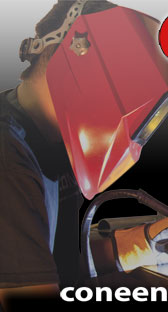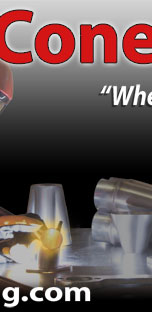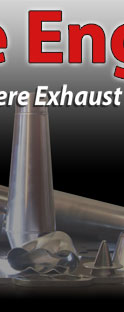|
Centerline Radius
On bends, this refers to the radius used to create the bend.
The smaller the radius is, the “tighter” the
bend. It is difficult to physically measure on anything but
a U-Bend (180 degree bend). It is measured from the center
point of one leg to the center of the other leg and divided
by two. An easier way to measure is from the outside of one
leg to the inside of the opposing leg. Remember that if the
bend isn’t exactly 180 degrees it will affect your
measurement.
Conical Length
Conical length is also the height, measured down the centerline
of the cone. Conical length is not affected by taper of the
cone.
Dimensions
For stock items, dimensions are stated in inches. The point
they are measured from is stated in the specifications for
that product. This link is to a popular conversion
calculator.
Included Angle
The entire angle that contains the taper. Included angle is
two times the taper.
Inlet
For cones, inlet generally refers to the smaller end of the
cone. On collectors, the inlet is where the header pipes
come into the collector.
Inside Diameter (ID)
Measured across the inside of the diameter. ID will vary from
OD based on thickness of the material. It is equal to the outside
diameter MINUS twice the material thickness. Typically you
need to know an ID when you want one part to fit INSIDE another
part. Cone Engineering designs components utilizing an ID with
a fitment factor to allow room to insert the OD of the other
part. For example, a flange for 1.50” OD tubing will
be slightly oversized to allow insertion without additional
fabrication.
Material Thickness (also Wall Thickness in tubing)
Measured in decimal or gauge (also gage). We generally use
gauge as the decimal equivalent can be slightly different
based on different measurement factors. Several good reference
sources are available on the internet to assist in converting
from one basis to another. Here is a link to a favorite web-based
conversion chart.
Outlet
Outlet generally refers to the larger end of the cone or on
collectors, refers to the exit end of the collector.
Outside Diameter (OD)
Measured across the outside of the diameter. It is also equal
to the inside diameter PLUS twice the material thickness.
Use this when you want one part to slip OVER another part
or if you will be butt welding two parts together.
Side Length
Length of the cone measured down its side. Side length is affected
by the taper of the cone. The greater the taper the larger
the differential between the side length and conical length.
Taper (also known as “occluded angle”)
Taper is half the included angle of the cone. It is expressed
in degrees and measured from vertical to each side of the
cone. Each edge of the taper forms a leg of the angle which
is a right angle. Click here for
a Cone Calculator >> Cone
Calculator to determine
taper based on your desired cone dimensions.
The “Right Size” Exhaust for Your Car or Motorcycle
Size does matter when it comes to exhaust in cars and motorcycles but bigger isn’t
always better. Determining the correct size is as much art
as it is science. Many exhaust fabricators have a wide variety
of sizes they recommend to suit a particular application of
which engine displacement is just one factor. Cone Engineering gives you a wide array of options so that
you can fabricate the exhaust you feel best suits your needs. Our
stock parts are designed to offer flow characteristics suited
to a broad range of uses. They can further be customized by
the end-user with simple modification. |







